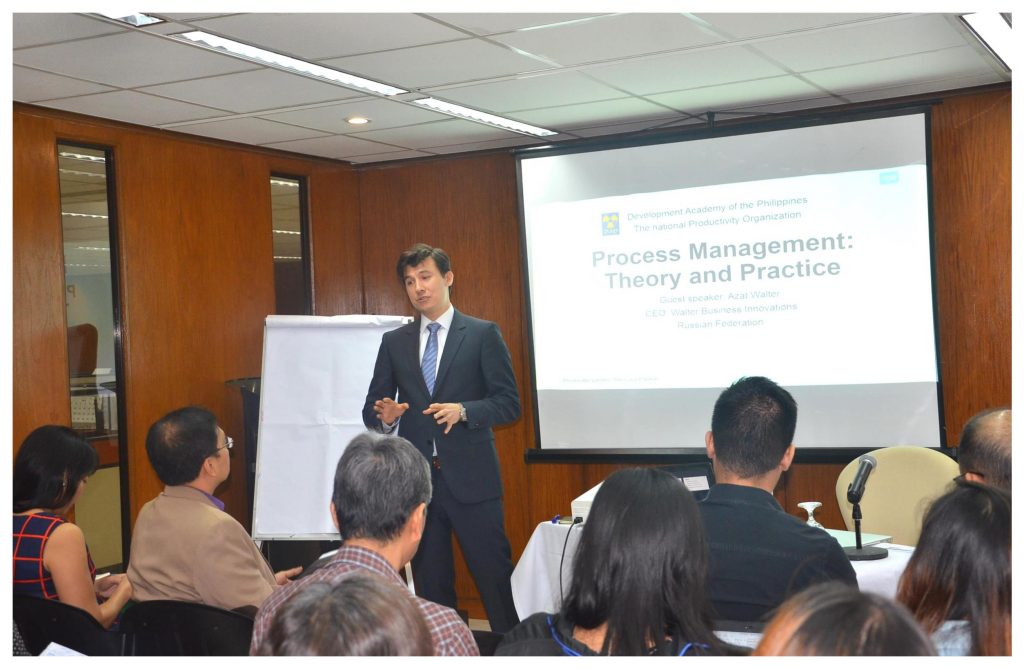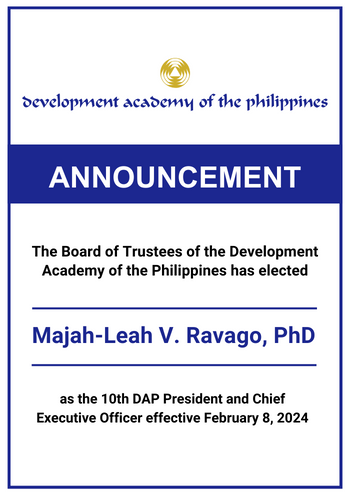
Azat Walter, CEO of Walter Business Innovations, talks about process management during a round-table discussion sponsored by the Development Academy of the Philippines’ Council of Fellows led by Executive Fellow Dr. Carlos Tabunda Jr. (seated, back to camera, second from left). (Photo by Meg Matias)
The top management of any corporation should be involved in the management of processes in its organization for that organization to succeed, an expert in process management and its theory and practice told personnel of the Development Academy of the Philippines.
Azat Walter, the chief executive officer of the Walter Business Innovations and a member of the Russian federation that recently visited the Philippines, said that the insufficient involvement of top management as well as process owners and experts and the lack of empowerment of process practitioners are among the biggest challenges in the practice of process management anywhere.
He said that the whole idea of employing systems and processes is to get processes work in a way that’s best for a company, that’s why he said it’s important for practitioners to talk first with management about the goal or the main direction one wants to move and process the nitty-gritty of a project after that.
A chain of processes
“A process is always a part of a chain of processes,” the 36-year-old executive said. “The main goal of a process is to deliver for the next process.”
Walter said the importance of process management is reflected in the fact that “80 percent of our work” are business processes, and “modern business is all about interface.” This is why process stability, he said, is a precondition to growth and international expansion for any business enterprise. He added that unclear processes inevitably lead to tension and frustrations within the company.
Walter also said that employing processes is imperative even if they’re far from perfect as “80 percent now is better than 100 percent never.”
Myths of process management
He then enumerated the myths surrounding process management, including the theory that all processes are measurable and can be evaluated; that once one has set up perfect processes, they will always work; that process owners and employees take full responsibility for processes and apply continuous improvement techniques; that if one can show people the mistakes they’re making in processes, they will thankfully adapt their procedures; and that a new best practice – the enterprise resource planning or ERP system, a system developed for 20 years and allows the management of resources – will solve problems.
It is thus important, Walter said, that one is able to address process management issues in his company properly by avoiding the usual pitfalls, like the over- or under-customization of standard ERP software, missing or non-transparent process framework, misevaluation of process optimization benefits, or scope that is either too small or too big for process optimization projects.
Politics and personality clashes
He added that political “games” in major holdings particularly by management or personality clashes and issues, like in a situation where information technology and organizational development people do not work together, will always be a possibility, and he thus underscored the importance of putting one’s self in the other person’s situation since people may have a different perception, for example, of the same process.
He cited two frameworks for process management – SCOR or Supply Chain Operations Reference and APQC or American Productivity and Quality Center. The former is the world’s leading supply chain framework that links business processes, performance metrics, practices and people skills into a unified structure, while the latter is the world’s foremost authority in benchmarking, best practices, process and performance improvement as well as knowledge management and “helps organizations work smarter, faster, and with greater confidence.”




